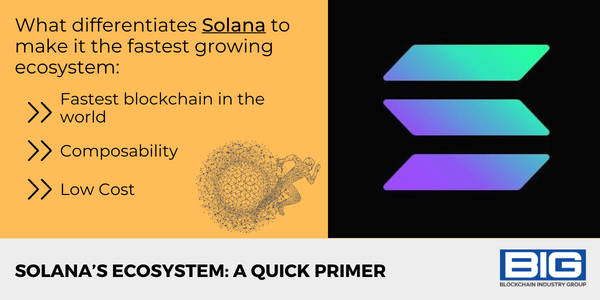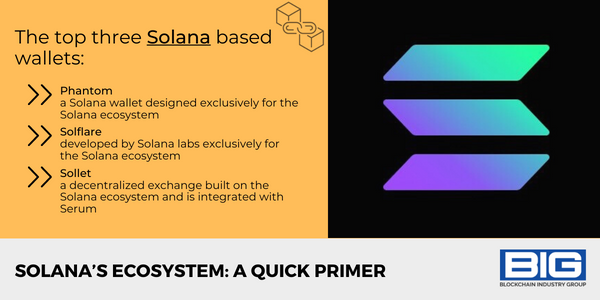Put simply, a blockchain’s ecosystem is a network of participants/decentralized application (dApps) in a blockchain that share business objectives and processes. Some would consider the network structure is also considered to be part of the ecosystem, but for the limited purpose of this article, we will not be delving into that aspect.
What differentiates Solana to make it the fastest growing ecosystem:
- Fastest blockchain in the world (400 millisecond block times, and potential for 65,000 tps and higher)
- Scalability
- Composability (allows different participants on Solana’s blockchain to communicate and work with each other)
- Low Cost (less than $0.01 for developer and users)

With over 1000 projects developing or developed on the Solana blockchain ranging from DeFi, GameFi, NFT, and Web3 among others, it has one of the fastest growing ecosystems in the crypto world. Having only begun operation in February of 2020, it is no small achievement that Solana has quickly grown to be amongst the top 10 cryptocurrencies in the world as measured by market capitalization, with DeFi and NFT making the largest gains.
Under the DeFi category, Serum (SRM) is a decentralized exchange (DEX) built on Solana’s blockchain. Serum’s strength is it runs an automated decentralized order book, utilizing smart contracts to directly connect the buyer and the seller, thus maximizing flexibility with pricing and order size. This is different from some other popular and more traditional DEX such as Uniswap, Sushi and Bancor which uses automated market maker (AMM) where traders buy and sell cryptocurrencies from liquidity pools.
Another advantage with Serum is that it offers cross-chain support which allows Serum customers to also be able to access Serum’s services and liquidity. To use ETH as an example, the mechanism for cross chain exchange requires that the buyer and seller to both send ETH to a smart contract (with built in dispute mechanisms) as collateral. If the buyer then sends his/her tokens to the seller in settlement of the transaction, then both parties will receive their collateral back. Other popular Dex that uses orderbook and running on Solana are: Dexlab, SolAPE Finance, Open Serum, Samoyedcoin, and Slope Funding, among others.
Raydium (RAY) was one of the early DEX platforms running on Solana. What makes them interesting is that even though they are like a traditional DEX that uses AMM for trades, Raydium partnered with Serum in order to harness the best of both worlds as between an order book and AMM system: When a user executes a transaction, Raydium compares prices with Serum’s order book and Raydium’s AMM, and can thus effect the most cost effective trade. Other reasons Raydium decided to join Solana’s ecosystem was so they could address high transaction fees, slow execution times, and lack of limit orders when compared to a popular and older DEX like Uniswap. Other popular DEX that uses AMM and running on Solana are Orca, Saros Network, Saber, Mercurial Finance, SenSwap, Cyclos, and HydraSwap, just to name a few.
Another category of DeFi is lending and borrowing. Where traditional systems go through a centralized institution like a bank, where the bank is essentially acting as the middleman between the borrower and the bank’s depositors’ money. DeFi creates a decentralized lending system that cuts out the middleman. One example is Oxygen (OXY)—a DeFi prime brokerage service built on Solana’s blockchain and powered by Serum’s platform.
Oxygen’s vision is to bring to DeFi all the services that traditional prime brokerages are known for in traditional financial markets. Starting with lending and borrowing services, lenders contribute assets to the creation of Pools containing various assets. The lenders can set the interest rate with terms via Solana’s smart contracts, and are then matched to potential borrowers through Serum’s decentralized on-chain order book system, thus removing the middleman (traditionally a financial institution) and greatly improving on processing speed while moderating fees. Other lending/borrowing services running on Solana include: Apricot Finance, Francium, Parrot, Solend, Port Finance, Jet Protocol, Acumen, among others.
A category that is growing in size, importance, and prominence in Solana’s ecosystem is NFTs, which stands for non-fungible tokens. “Non-fungible” means the item is unique and cannot be replaced, and it can be almost anything that exists in the digital world, but it is primarily the sale of NFT art that exploded into everyone’s consciousness in 2021 and continued into the early part of 2022. For a time, it seemed like a weekly occurrence when another record was broken on the sale of an NFT.
The top 10 most expensive NFTs ever sold starts at $7.6 and $7.7 million, with number eight and above selling for over $10 million. The all time most expensive NFT sold for $91.8 million in December of 2021, and even though the financial markets have taken a hit in the 2nd half of 2022, the pace of NFT sales has continued from 2021 and is on pace to beat last years total sales–projected by some to reach $90 billion in 2022.
Most people only became aware of NFTs in 2021, but the medium has been around since 2012 (or 2014 by some accounts). Basically, an NFT is essentially a type of token where only one (or a very limited amount) has been minted. Another interesting fact about NFTs is that it is supposed to give you unique ownership of an item that cannot be copied, even though the artist can sometimes retain copyright and reproduction rights. Users would have to join a marketplace in order to create (mint), sell, and buy NFTs. OpenSea originally started on the Ethereum blockchain, and is arguably the first and most popular marketplace. However, it has added Solana integration
One of the most popular marketplaces on Solana is Magic Eden—Benefiting from fast and low transaction fees due to Solana’s architecture, and they don’t charge any fees for listing NFTs. In an effort to widen their customer base, Magic Eden announced on August 2, 2022 that it will go multi-chain and integrate Ethereum NFTs into their platform. They will be able to offer to their new Ethereum NFT customers the same benefits and tools currently on offer to their Solana customer base. Currently, Magic Eden already handles about 90% (even higher by some estimates) of the trades on the Solana platform. OpenSea is the Ethereum counterpart to Magic Eden on Solana, but despite the fact that OpenSea enjoys a headstart, launching in December of 2017 and boasting mulit-chain operation with support for Solana, Ethereum, Klaytn and Polygon, Magic Eden is poised to challenge for the top spot in NFT supremacy with its own multi-chain integration with the Ethereum blockchain.
Wallets are a very essential part of any ecosystem on a blockchain. Without wallets, there would be no way to send, receive or exchange assets or items of value. The first thing you need to establish in your mind is that wallets don’t actually hold any crypto coins or NFTs. Since crypto assets are purely digital in nature, it exists simply because it has been recorded on a blockchains distributed ledger (the immutable record of the proof of your ownership of a certain coin or asset). What is important is that you have the private key which will allow you to manage and make changes to the asset (transfer it in exchange for another coin, send it to someone in exchange for something of value, buy an NFT, etc.). If you lose your private key, you will have essentially lost the asset that is controlled by this key. A crypto wallet’s job is to secure your private key so that you, as the rightful owner, are the only one that has access to the coin or asset under control.
There are different types of wallets. It can be as simple as a piece of paper with your private key written on it and stored in a secured place. Your key can also be stored on some type of electronic media like on a thumb drive or even just on a file in your computer hard drive (which, hopefully, you would have encrypted). Or it can be with an online wallet where your private keys are stored in an app or piece of software that is managed by a trusted third party such as Coinbase or Exodus. There are obvious pros and cons to each method, but the online option is by far the easiest and most popular way to manage your crypto assets because you can send, receive, or otherwise manage your crypto assets as simply as you would do online banking.
The top three Solana based wallets are Phantom, Solflare, and Sollet. A couple of 3rd party wallets with tight integration to the Solana chain are Atomic Wallet and Exodus Wallet.

- Phantom is a Solana wallet designed exclusively for the Solana ecosystem. It is non-custodial (you must secure your own assets) and is compatible with most popular browsers. Phantom allows you to swap some popular tokens like SOL, USDC, USDT, ETH, BTC, etc. and you can store NFT, and stake SOL. It supports SPL tokens.
- Solflare was developed by Solana labs exclusively for the Solana ecosystem. Its almost equal in popularity with Phantom and actually is able to support more platforms. It functions on most popular browsers and has its own mobile app. It shares a similar set of functionality as that of Phantom with minor differences.
- Sollet is a decentralized exchange built on the Solana ecosystem and is integrated with Serum. Its quite popular but it is only available as a browser extension and is targeted towards advanced users and developers. One distinguishing factor differentiating Sollet from Phantom and Solflare is that it has the ability to hold ERC20 tokens.
All the different services provided by the different platforms and applications that run on Solana’s blockchain are too numerous and defies easy categorization. Many falling under the overarching umbrella of DeFi, we will list some popular categories below which we do not claim is exhaustive and will not go into detail in the interest of brevity for this article:
- Options – Zeta, PsyOptions;
- Aggregator – SolFarm, SolYard, Sunny;
- Asset Management – Solrise, Symmetry, Step Finance
Categories not falling under DeFi:
- Launchpad – AcceleRaytor, Solstarter, Solanium, Solpad;
- GUI – Bonfida;
- Gaming – Star Atlas, OpenEra, DeFi Land;
- NFT – Magic Eden, All Art, Metaplex, Degenerate Ape, Kaiju Cards, Sollectify, Solanart, Solse;
- Social Platforms – MAPS, Media Network, AUDIUS, Only1, GRAPE protocol, Satellite.im, SolDate;
- Oracle – Pyth Network, Switchboard;
- Bridge – Allbridge, Swim Protocol, Wormhole, Synapse Protocol;
- Staking Pool – Marinade.finance, Socean;
- Wallet Extension – Coin98, Phantom, Sollet, Math Wallet, Solong Wallet;
- Tools – Sonar, Apeboard, Serum Pulse, SolanaProject, Solscan, Synchrony;
- Others – Burnt Finance, Steaking, Solstake, Rope Official, Lava Cash.
An article written by Tom Lee, BIG Writer



